Animal Bloodmobile
Kimberly Marryott, Penn's Animal Blood Bank
 Oh sure, you've seen the mobile blood banks that routinely troll for human blood. But you've probably never seen a mobile blood bank for dogs. Kim Marryott saw the need and now she manages a program in Pennsylvania that collects the twelve different canine blood types for transfusions and other life-threatening procedures. As far as Kimberly Marryott knows, this is the only mobile unit for dogs.
Oh sure, you've seen the mobile blood banks that routinely troll for human blood. But you've probably never seen a mobile blood bank for dogs. Kim Marryott saw the need and now she manages a program in Pennsylvania that collects the twelve different canine blood types for transfusions and other life-threatening procedures. As far as Kimberly Marryott knows, this is the only mobile unit for dogs.
The Penn Animal Blood Bank is located in the center of Philadelphia, which makes it hard for people to bring their dogs out to donate blood and actually find parking. The blood bank wanted to make it easier for them, and take the equipment right to their front door. They can also meet at a shopping center or even a veterinarian office.
Dogs can safely donate 10mL per pound. However, they ask that all dogs donating blood be over 55 pounds, so they can actually donate a pint.
The pint of blood is then taken back to the facility where it is processed down into two units of plasma and one unit of packed red blood cells. This means the blood can actually go to three different dogs. The packed red blood cells has a shelf life of about 28 days, but the plasma is frozen, which can then last up to a year.
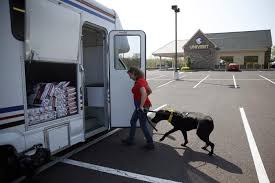 Unlike human blood, there are over a dozen different types of blood in dogs. There is also one type, which is called DEA 1.1 negative, which is what is considered the universal blood type in dogs. This type of blood is common and found in almost one out of every two dogs. This allows that particular blood to go to any dog in need.
Unlike human blood, there are over a dozen different types of blood in dogs. There is also one type, which is called DEA 1.1 negative, which is what is considered the universal blood type in dogs. This type of blood is common and found in almost one out of every two dogs. This allows that particular blood to go to any dog in need.
While blood is species specific, meaning a dog cannot donate blood to a cat, it is not breed specific, so a dog can donate to any other type of dog breed as long as they have the same blood type.
The dogs are not sedated when giving blood and can leave if they want to. But, there are some that have donated to so many times, they voluntarily jump up on the table and lay there.
Just like people, the furry donors get a snack (a huge bowl of what is called doggy chocolate cake), and a heart-shaped "U of P Blood Donor" sticker immediately after giving. In addition, they receive free blood screenings (about $500 worth of free blood work) and dog food to take home.
And what about a catmobile? Perhaps not surprisingly, felines are bit less cooperative. They need to be sedated in order to give blood, so Penn does that only at its animal hospital.
Visit Website
"HERO PEOPLE OF THE WEEK" - Female Inmates
 This week's Hero People are in prison. Female inmates are teamed up with a dog 24/7. Their mission is to train these shelter dogs to help autistic children. It's a second chance for the inmates, the dog and the child. Program Director Janette Thomas explains how the Pups in Prison initiative is a win, win, win!
This week's Hero People are in prison. Female inmates are teamed up with a dog 24/7. Their mission is to train these shelter dogs to help autistic children. It's a second chance for the inmates, the dog and the child. Program Director Janette Thomas explains how the Pups in Prison initiative is a win, win, win!
In March 2012, inmates at California Institution for Women (CIW) began training shelter dogs to become working partners with children diagnosed with Autism.
In partnership with Pathways to Hope, a nonprofit community organization, the program gives inmates the chance to be trusted with responsibility and give back to the community.
The dogs are taken from local shelters and rescue groups, taken into the institution, where the female inmates have been trained to train the dogs specifically for children with autism.
This includes a basic obedience program, which lasts about 10 weeks. The dogs with exceptional temperament are then moved on to the advanced training phase where they go under about four to six months of intensive training and socialization so they are appropriate for these kids with amazing challenges in life.
During the initial 10-week training, the dogs stay in the cell with the inmate, which many of the inmates treasure and also find therapeutic.
To qualify for the program, inmates must be physically fit and able to lift 45 pounds. They also must have a minimum of two years remaining in their sentence, must be clear of discipline for the previous year and cannot have a history of violence to animals or children. They also have to complete a training class as well as sit in on lectures and demos so they can learn how to work with these dogs
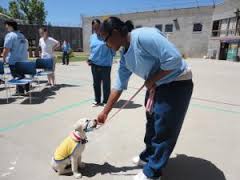 Not all inmates qualify for the program and not all inmates want to. These dogs are a 24/7 commitment, which is a lot of work. You might think, well, what else would these ladies do? The all have full-time jobs and they do the training as a volunteer. These dogs are never kenneled and are with the inmates full-time, even going with them to work. If they can't take them because they work in a place like the cafeteria, where dogs aren't allowed, they have to find someone else to temporarily care for them.
Not all inmates qualify for the program and not all inmates want to. These dogs are a 24/7 commitment, which is a lot of work. You might think, well, what else would these ladies do? The all have full-time jobs and they do the training as a volunteer. These dogs are never kenneled and are with the inmates full-time, even going with them to work. If they can't take them because they work in a place like the cafeteria, where dogs aren't allowed, they have to find someone else to temporarily care for them.
When the dogs arrive, an inmate is selected to work with each particular dog based on their personality as well the as personality of the dog. They want to make sure they have a good match as opposed to trying to fit a square peg in a round hole.
What happens to a dog that doesn't pass the class? Janette assures us that if a dog doesn't have the "right stuff," no dog is returned to the shelter, and members of the general public adopt them. These are still great dogs; because they have been trained and the institution knows everything about them, such as do they like men? Do they like kids? They are then able to work on their needs before they graduate.
Once they have completed the program, the inmates have also learned a lifelong skill. Many of the women who get out on parole, with the guidance and mentoring of the institution, have gone on and secured jobs in training dogs.
The Pathways To Hope is a 501(c)(3) corporation and none of the institutions pay for this program, it is provided to them pro bono. The Pathways To Hope is totally self-sufficient and depends on in kind and monetary donations.
Because the dogs are in a correctional facility 24/4, they would also love to have fosters who can take then out for a weekend, generalizing their behavior for the outside world.
Visit Website
Restriction On Breeding "Franken Cats"
Daniel Lutz, Animal Legal Defense Fund
 Animal Defense League's Daniel Lutz is petitioning the courts to outlaw exotic hybrids of wildcats. He says cats have been responsible for 14% of all the world's extinctions since 1600. Will legislation make a difference in our ecosystem?
Animal Defense League's Daniel Lutz is petitioning the courts to outlaw exotic hybrids of wildcats. He says cats have been responsible for 14% of all the world's extinctions since 1600. Will legislation make a difference in our ecosystem?
The legislation is to restrict the breeding and possession of hybrid cats; the result of crossbreeding between house cats and wild cats such as Asian leopard cats or African servals.
Hybrid cats are being bred more and more because people are attracted to the wild look of them. They happen to have a common experience with many other exotic pets in which people are thrilled to own them and find them really cute when they're young. But then they will grow into an animal that people are really unprepared to care for.
While these cats are not lions, they may act like one. They also pose many threats to native wild life and to humans. They also suffer harm themselves through the breeding process.
 These hybrids can be a number of many cats, but usually domestic cats are bred with Asian leopard cats, jungle cats or even an African serval, which is listed as an endangered species.
These hybrids can be a number of many cats, but usually domestic cats are bred with Asian leopard cats, jungle cats or even an African serval, which is listed as an endangered species.
The resulting hybrids can be a little wild and tend to bite and scratch more readily. Many also have urinary problems resulting in inappropriate urination, because they have that wild drive to mark in the home. These hybrids are often larger than an average domestic cat.
Lutz said that homeowners who tire of their exotic pets have difficulty finding places to take them, increasing the risk of abandonment. He said that many shelters refuse to accept the hybrids and that many end up in big cat sanctuaries.
The Animal Legal Defense Fund is a co-petitioner on a petition to restrict hybrid cats in California with a few other sanctuaries that are inundated with these cats. These sanctuaries are where these cats often end up because they cannot get along well and don't fit in with your average dog and cat shelter. The petition states that these pets pose a potential health risk to humans as well, citing that no known rabies vaccine exists for the cats.
Visit Website
Get Your Pet To the Vet Safely with No Escapees - Dr. Debbie
 A frightening situation occurred the other day at my veterinary hospital. Working inside my office, I could hear a woman's shrieks coming from the parking lot. I ran outside to find a woman with one dog on a leash, and the other dog skittering about the parking lot - the result of a slipped collar. The owner would approach the panicked dog and he'd retreat, darting under nearby cars. Those familiar with our hospital location understand its proximity to a busy intersection. Should the dog run in the wrong direction, he'd meet up with 45 mph traffic.
A frightening situation occurred the other day at my veterinary hospital. Working inside my office, I could hear a woman's shrieks coming from the parking lot. I ran outside to find a woman with one dog on a leash, and the other dog skittering about the parking lot - the result of a slipped collar. The owner would approach the panicked dog and he'd retreat, darting under nearby cars. Those familiar with our hospital location understand its proximity to a busy intersection. Should the dog run in the wrong direction, he'd meet up with 45 mph traffic.
My staff was outside in moments to assist the owner in retrieving her dog and safely escorted everyone into the building. Thankfully my client's few minutes of terror ended uneventfully. But that's not always the case. I've seen dogs run straight into the road, cat's leap from a family member's arms, and owners dive into oncoming traffic trying to catch an escaping pet.
The lesson is simple. Don't underestimate your pets' fears. Fear of car travel, new places or the veterinary office can cause a pet to behave in unpredictable ways. If you know your pet to be nervous with new people or new situations, be especially vigilant when transporting your pet in a vehicle.
Identify Your Pet
Use two methods of identification for best insurance your pet is returned to you if lost. Permanent identification with a microchip is a must and should be complimented with a collar and ID tags.
Restrain Pet in Vehicle
Keep your pet secure during travel and when the car door opens by using a doggie seatbelt. Small dogs and cats should be housed in a pet carrier which is secured with seatbelt to avoid undue carrier movement during travel. Do not allow cats and small pets to roam freely in the car. Cats have been known to take cover under car seats which may require sedation or seat removal to extract kitty from her hiding place.
Check for Proper Fit
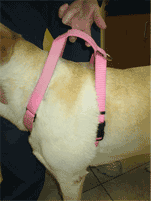

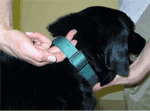 A proper fitting collar allows 2 finger widths between the collar and pet's neck. Allow more than, and should your pet put on the brakes, he'll easily slip out of the collar. Poor fitting harnesses are just as dangerous and allow gap room which allows a back-peddling pet to wiggle out. Not sure if the collar is too loose? Snug the collar up one fitting in anticipation of your trip to the vet.
A proper fitting collar allows 2 finger widths between the collar and pet's neck. Allow more than, and should your pet put on the brakes, he'll easily slip out of the collar. Poor fitting harnesses are just as dangerous and allow gap room which allows a back-peddling pet to wiggle out. Not sure if the collar is too loose? Snug the collar up one fitting in anticipation of your trip to the vet.
Try Other Collar Styles
Even if you don't normally use a choker or pinch collar, consider using one when going to the vet's office. For thick necked dogs with smaller head size, try the Martingale collar, a fabric and metal combo collar that snugs down should your dog try to back out. Boisterous dogs that jump and leap when on leash may benefit wearing a head collar that fits over the muzzle. Ensure your collar choice is properly fitted, since any of these styles can fail if improperly fitted or used incorrectly.
Call Ahead
If you anticipate difficulties getting your pet to the vet's office, call ahead. Veterinary staff members are on the ready to help ensure your pet's visit is a safe one.
So, take a few minutes to consider your pet's travel safety before heading out on that next car trip, whether it is to the park, groomer or veterinary office. Your four legged friend will thank you, but may pout on the way there.
Featured veterinarian known as "Dr. Debbie" on national pet radio program, Animal Radio. Ebook author of "Yorkshire Terriers: How to Be Your Dog's Best Friend"; "Pugs: How to Be Your Dog's Best Friend"; "Mini Schnauzers: How to Be Your Dog's Best Friend"; and "Shih Tzu: How to Be Your Dog's Best Friend." Dr. Debbie's books.
Visit Website
Animal Radio News with Tammy Trujillo
Want To Know Who's The Daddy? Do A DNA Test!
If you have a mixed breed dog, you might consider getting him or her a DNA test. Not only will you find out just what combination of breeds went into your best friend, but also Dr. David Linzey of the North Carolina Veterinary Medical Association says you might find out some valuable health information. Certain breeds have a tendency to certain health issues, so finding out your dogs breed mix could allow your vet to take preventative and proactive measures. Most DNA tests you can even do at home yourself and then send the test off to get the results.
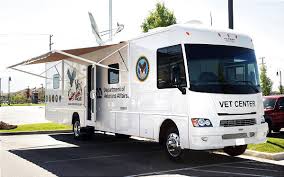 Vets Don't Always Work In The Office
Vets Don't Always Work In The Office
Vets treat animals in many settings like barnyards and sometimes even backyards. And to do it, they often need to carry controlled substances like medicines for pain management, anesthesia or euthanasia. But, the DEA doesn't let them carry those medications outside their registered places of business, usually their vet hospital. Now that is closer to changing. The House of Representatives has passed the Veterinary Medicine Mobility Act. The bill was sponsored by the only two veterinarians in Congress, Democrat Kurt Schrader of Oregon and Republican Ted Yoho of Florida. If the legislation becomes law, it would mean that vets would be able to provide mobile spay/neuter clinics, on-site care at rural ranches, disaster response and at-home euthanasia without being worried about breaking the law.
Regulation For Pet Insurance Industry
We all know how expensive veterinary bills can be, but only 1-percent of pet parents have pet insurance. Many of the people who do, say their policies are confusing and in some cases, downright misleading. That might be because people expect the policies to be like human health insurance. But since pet insurance falls into the category of property insurance, there basically are no rules. California may become the first state to change that. The state's Department of Insurance has gotten so many complaints about pet insurance being unfair that Democratic Assemblyman Matt Dababneh of Los Angeles is reviving an effort that was vetoed by former Governor Schwarzenegger to set guidelines for the pet insurance industry. If California is successful, it could prompt a countrywide effort to regulate the pet insurance industry. Americans are expected to spend more than 15-billion on pet care this year.
 Listen to the entire Podcast of this show (#1084)
Listen to the entire Podcast of this show (#1084)





